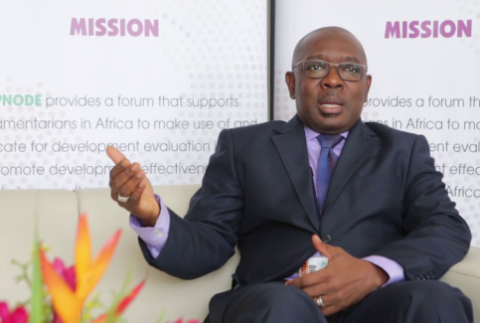
On the sidelines of the 5th Annual General Meeting (AGM) of the African Parliamentarians’ Network on Development Evaluation (APNODE), Honorable Abbas Imbassou Ouattara, member of the National Assembly of Cote d’Ivoire and newly elected vice-chairperson of APNODE accepted to take part in a short Q&A with IDEV.
IDEV: Dear Honorable, in your opinion, what is the role of parliamentarians in building evaluation capacity in Africa?
Hon. Imbassou: The role of parliamentarians in building evaluation capacity in Africa can be seen at three levels:
First is the capacity they have to institutionalize evaluation so that evaluation isn’t just a benevolence of the rulers, but rather a requirement. By writing it in the Constitution and also in the Rules of Procedure of our parliaments, it also becomes mandatory for the parliamentarian himself who will then promote the evaluation culture.
The second is the capacity parliamentarians have to request for evaluations of government policies and programs. Year-on-year, parliamentarians vote on not only the national budget and regulatory laws, but also ordinary laws – laws that concern the environment, health, human rights – which are areas to evaluate and to inform using evaluation results.
The 3rd level is the capacity of parliamentarians to provide evaluations as well. A parliamentarian must be able to offer/conduct an evaluation, because more and more we have in our parliaments, leaders who have evaluation capacities, who are statisticians or development planners by training. They are thus equipped to make sure that evaluation becomes a daily practice in our national ecosystems, for a better impact of government policies and programs on the lives of our people.
IDEV: In your opinion, how can APNODE, in collaboration with regional parliaments and the African Union, contribute to the implementation of the African Continental Free Trade Area (AfCFTA)?
Hon. Imbassou: The role of parliamentarians in the establishment of the African Continental Free Trade Area is a key role because parliamentarians are those who vote and ratify such projects nowadays. I know that 54 countries have signed, but only 27 have ratified.
Accordingly, there is need for advocacy and sensitization by the APNODE National Chapters within African parliaments. This will ensure that all those who have signed, will ratify quickly in order for AfCFTA, this continental free trade area that is meant to facilitate the lives of our people and our businesses, becomes a reality. Doing so will also help to do away with the obstacles we know (e.g., visas, long waits to cross borders, etc.) and that gradually, according to the objectives of the African Union Agenda 2063, our continent should be rid of as much poverty as possible while enhancing infrastructure to give our continent a better standing.
IDEV: In closing, as a member of the Executive Committee of APNODE, what is your vision for the growth of this network over the next five years?
Hon Imbassou: The first thing is to face the fact that increasingly our parliamentarians are moving in the right direction: that is being able to demand and utilize evaluations.
In terms of the growth of the network, I’m quite optimistic because year after year we see the evolution of the network. Today it is hoped that all African parliaments, if not a member of APNODE themselves, still accept the creation of a National Chapter of APNODE within their institution. This will give the Network greater visibility and will also serve our African governments and populations better because MPs will no longer be governing by instinct, but rather by planned, evidence-based development. Planning that can be assessed over the short-, medium – and long term. This is all the more important because we feel the enthusiasm of the parliamentarians who come to each APNODE Annual General Meeting.
Each year new members from new countries join the network. This augurs well for the network and I think that once the issue of financial resource mobilization is resolved, APNODE will meet its challenges with great satisfaction.

